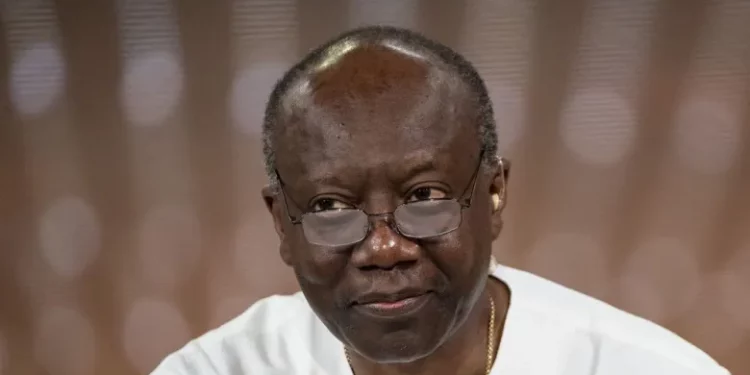Ghana‘s worsening economic conditions attributed to failure to sign onto DSSI
“Kristalina (IMF Boss) and I were talking yesterday with the Group about the Common Framework. If countries could have a situation where the common framework clause allow the country to have a standstill on debt, that would help the country choose their path forward on debts restructuring. That would mean they would get a break on debt repayment while they work on debt restructuring.

Ghana’s worsening macroeconomic conditions such as the fast depreciation of its currency, has been attributed to the failure of the country to sign onto the Debt Service Suspension Initiative (DSSI) developed by the IMF and World Bank.
Signing onto the DSSI which expired in December 2021, would have offered Ghana the opportunity to freeze debt servicing, whiles they concentrate on using their minimum funds to deal with other commitments.
- Advertisement -
Responding to questions at a media engagement in Washington DC on suggestions that the Bretton Wood institutions are not doing enough to help cancel the debts of some African countries in distress, President of the World Bank, David Malpass expressed disappointment that some developing countries like Ghana did not sign onto the DSSI, which would have provided some financial space for the repayment of loans.
- Advertisement -
“Kristalina (IMF Boss) and I were talking yesterday with the Group about the Common Framework. If countries could have a situation where the common framework clause allow the country to have a standstill on debt, that would help the country choose their path forward on debts restructuring. That would mean they would get a break on debt repayment while they work on debt restructuring.
“Unfortunately, Nigeria and Ghana did not ask for the common framework treatment (DSSI),” Mr Malpass stated, adding that the situation has made it difficult for such countries to overcome the negative impact of current global economic hardship on trade and currencies of developing countries.
Prove debt sustainability and get a deal – IMF tells Gov’t
Meanwhile, according to the IMF, Ghana has to show proof that its debt levels are sustainable before it can approve an economic support programme for the country.
That is according to the Director of IMF’s African Department, Abebe Aemro Selassie.
Mr. Selassie told the media in Washington on October 14, that the country also needed a credible economic reform plan before an agreement for a fund-assisted programme could be reached.
- Advertisement -
While insisting that the IMF is “extremely responsive” to the urgency of the country’s bailout request, the Director of the IMF’s African Department said “so much will depend on how quickly this reform plan can be fleshed out for implementation.”
“There are also important initiatives that have to be taken in terms of how the programme will be financed so that we can move forward,” Mr. Selassie said while responding to a question on when the country could expect a fund-assisted programme to help shore up reserves, curtail extreme price increases and regain market and investor confidence.
The press conference formed part of the 2022 IMF/World Bank annual meetings that ended on October 16.
Ghana’s debt stock peaked at GH¢402.4 billion in September, equivalent to 68 per cent of GDP, and the debt service cost is estimated to be consuming more than 80 per cent of total revenue and grants.
On the debt sustainability precondition, Mr. Selassie explained that the IMF always insisted on lending to countries with sustainable debts as a way to ensure that finances and resources from a fund-assisted programme are channeled into critical areas that impacted lives and the economy.
As of September, the cedi had lost more than 30 per cent of its value to the US dollar, partly pushing that month’s inflation rate to 37.2 per cent, the highest in almost two decades.
To help mitigate the impact on lives and the economy, the Finance Minister, Mr Ofori-Atta, has said President Nana Addo Dankwa Akfuo-Addo was keen on the government reaching a deal by December.
The Managing Director of the IMF, Kristalina Georgieva, said last September that a deal by December was possible.
Source: newsghana.com.gh
- Advertisement -



